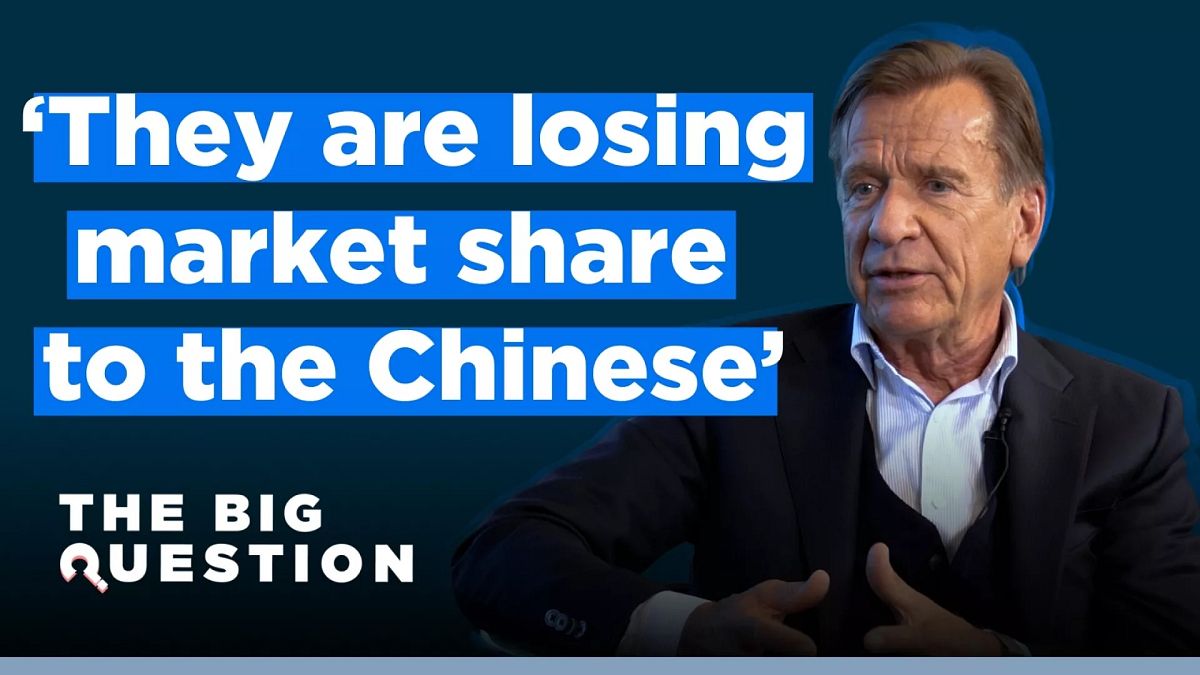There are around 256 million cars on the roads in the European Union, according to data from the European Commission.
With ambitious targets to phase out new petrol and diesel powered cars in the EU by 2035, an influx of Chinese EV brands such an BYD entering Europe and trade tariffs threatening the export market, the European automotive industry is at a critical moment.
“I think to have a credible end date for combustion cars there needs to be a very credible date also for investments and expansion of the charging networks. Otherwise, it will not be possible to be all electric by 2035,” Håkan Samuelsson, CEO and president of Volvo Cars, told Euronews.
But what else needs to be done to ensure the industry stays alive, kicking and competitive?
In this episode of The Big Question, Eleanor Butler sat down with Håkan Samuelsson to discuss the future of the automotive industry in Europe.
Emissions targets softened
In order to meet climate targets, the EU has introduced carbon limits for carmakers, looking at average emissions across a fleet.
Many carmakers have sought to collaborate with other firms on these targets, forming “pools” and combining their emissions. This means that companies with low-carbon or zero-carbon fleets can sell credits to more polluting automakers, permitting them to use a portion of their allowance.
While EV frontrunners benefitted from these targets, demands are now softening. For instance, automakers can now average their emissions over three years instead of one. This means that if they overshoot the limit for one year, they can aim to undershoot for the next and avoid penalties.
“We plan, we develop these cars and we also, of course, saw value in emission credits that we could sell to other builders who are not as fast. And I think that’s a good way of using that money to speed up the transition. And that is, of course, a big drawback now with the delay of everything, which is not good for our company,” Håkan told The Big Question.
He also added that although countries like Norway are very advanced with their charging infrastructure, EV targets will not be met until charging capacity is boosted across the bloc.
“I think we need to rely on the possibilities to drive on a combustion engine when you lack charging possibilities,” Håkan added.
Localised production for local tastes
While some European carmakers are calling on the EU to impose tariffs on foreign competitors, Håkan takes a more liberal approach.
“There is really no protection in the form of tariffs or other ways. The only protection for our industry is that we shape up and we need to be more competitive.”
“I think a good forecast is that we will have very tough competition from new Chinese EV players [in the EU]. And then the sooner we get used to that and the sooner we start developing our cars, the better,” Håkan told The Big Question.
In Europe, Volvo has already begun to produce the popular EX30 model in Ghent, Belgium in a bid to reduce delivery time and transportation costs and emissions.
It’s a similar situation in the US, where Volvo has a production plant in Charleston, South Carolina. Håkan hopes to increase production capacity here, not only to avoid Trump’s tariffs but also to be closer to the customer base.
“We need now to find a bread-and-butter model that can sell in high volumes, which we can deliver faster to our customers and of course reduce stock and transportation costs. So local production is not only a cost increase, it has advantages also.
“So even if the tariffs come down to a more reasonable level, we still need to use our factory more than we do today,” he added.
And in China, Håkan stressed that Volvo needs to really focus on what the local market is asking for, rather than replicating European offerings.
“Chinese customers are very tech-interested, so they like a lot of software features in their cars,” he explained.
“And I think that’s an example of a situation where you can’t just put European-developed features in the car, you need to develop [the tech] together with the Chinese to really lead.”
The Big Questionis a series from Euronews Business where we sit down with industry leaders and experts to discuss some of the most important topics on today’s agenda.
Watch the video above to see the full discussion with Håkan Samuelsson.
